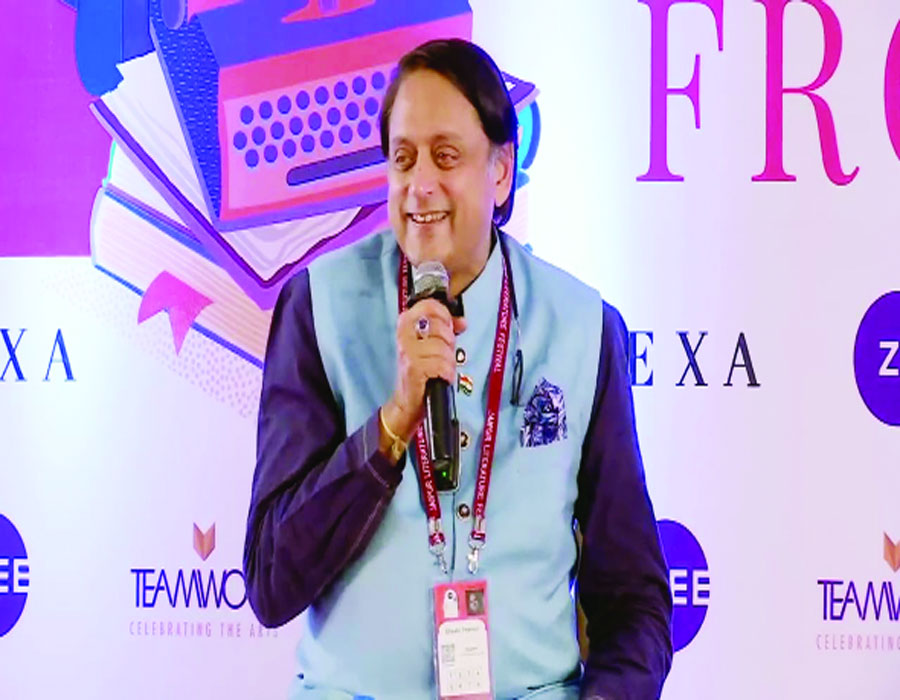The Jaipur Literature Festival conjures up a lot of images not only for the mind’s eye but also for the soul and intellect of the attendees
So, it’s a dark and somewhat hot night. The Rambagh Palace was beautified as a fair Rajput maiden, ready to receive the who’s-who of literature. After all, it was the opening dinner for the Jaipur Literature Festival (JLF). With a ‘friend of the festival’ pass neatly tucked in my pocket, the company of ambassadors, “kings”, “princes” and the elite of Jaipur awaited me. Amidst them was a silver-haired magician. Sanjoy Roy’s craft had conjured up the JLF many years ago.
The JLF brings beauty and brains to Jaipur, and after-parties are where you get to really meet them off guard. Intoxication, glib flirting and snobby men; no Jaipur after-party is complete without these, and I stuck around till 4 am. Night one was over, and I passed out.
Day One began early. I was at the JLF grounds around 10 am, sipping coffee, still waking up. What struck me was the Palestinian media advisor, wearing a blue linen suit and an undiplomatic personality. I said a ‘Hail Mary’ for the future of Indo-Palestinian relations, and moved on to the sessions. And guess what I found: More diplomats!
Wearing a modern black bandhgala (traditional Indian-wear), over 6’3” tall, German ambassador Walter Lindner towered over everyone around him. He was proactively Russia-bashing and calling the Ukraine-Russia conflict as “Putin’s war”. But a young Caucasian woman broke his spell: “Why is Germany accepting Ukrainian refugees and not Syrian or middle-eastern ones?” A Russian agent in the crowd? Nope, but a defiantly truthful agent! But my “geo-politics”quota was over. I swerved towards Remo, the musician, who was talking about his life and book. Half an hour in, Remo proved his singing was better than his talk.
Behind the main stage, there was a cloistered space aka the writer’s lounge. Naturally, it had the best booze, gossip and food. So I entered and was soon joined by a middle height, bluish jacket-wearing man. This writer-looking-man actually was Turkish Ambassador Firat Sunel, there with his daughter. We chatted about Turkey, the Ottomans, new-age politics, Indo-Turkish relationships and the heartthrob of many Indians — Ertugrul. But our candid conversation was soon to end; the Sunels left early to prepare for his book reading. The JLF music night was on, but I stuck to the bar and conversations. Brushed shoulders with Shashi Tharoor on my way out and headed for the after-party.
Now Day Three was super fun, not because I was hitting the “coffee pot” since 10 am but because I was to hear Mak Dizdar, one of the greatest Bosnian poets translated into Hindi. For an hour or so, I was floating in Dizdar’s world and his Bosnia, narrated through the words used by Firaq, Iqbal and Ghalib. However, Mak was no showstopper, though Manoj Bajpayee was. His session was overcrowded, so I caught up with him in the lounge. My question — what was the future of Hindi culture? Where does the hinterland culture go for laurels? His reply suited him as well as his chic brown leather shoes: “There is a scarcity of platforms. There are now places like this (JLF) which give us platforms, and we deeply appreciate it. Today, we work in Hindi films, yet people of the industry don’t know Hindi. But nevertheless, people all over the Hindi belt are organising films and art gatherings. But the media doesn’t show it. It will take time, but it’s happening.”
By the time the day ended, I had digested many sessions covering electoral bonds to UP elections and even heard a former election official say, “You need money and muscle to win elections.” Now,
Day Three was Shashi Day, with Tharoor participating in three-four sessions, pulling thousands of people to the venue. Far from being a Fargo of distortions, Shashi did share his views on India and other topics and was flanked by hundreds for selfies and book signings. As the day was ending, Tharoor’s words were still buzzing in my head: “India denied to someone among us today, will be denied to all of us tomorrow. We must never give up, despite setbacks.”
The next two days dealt with issues such as climate change, music and the usual joie de vivre. To sum up, I met up with Sanjay Roy again, and asked him about the secret to his energy. Surprisingly, it wasn’t coca or caffeine, but meditation done every morning. Roy had also collected a group of young men, who were at the heart and soul of his organising abilities. What was his message? “It’s young people that can bring about a change; our generation has failed both the planet and the newer generation. The only question for young people is — can they continue to be curious? Can they continue to ask questions about the world?” the wizard had spoken and my time was up. It was a long ride to Delhi, and still little time to filter through the memories of the five days at the JLF.
(The author writes on agriculture and environment, and is a former Director — Policy & Outreach, National Seed Association of India. The views expressed are personal.)


























